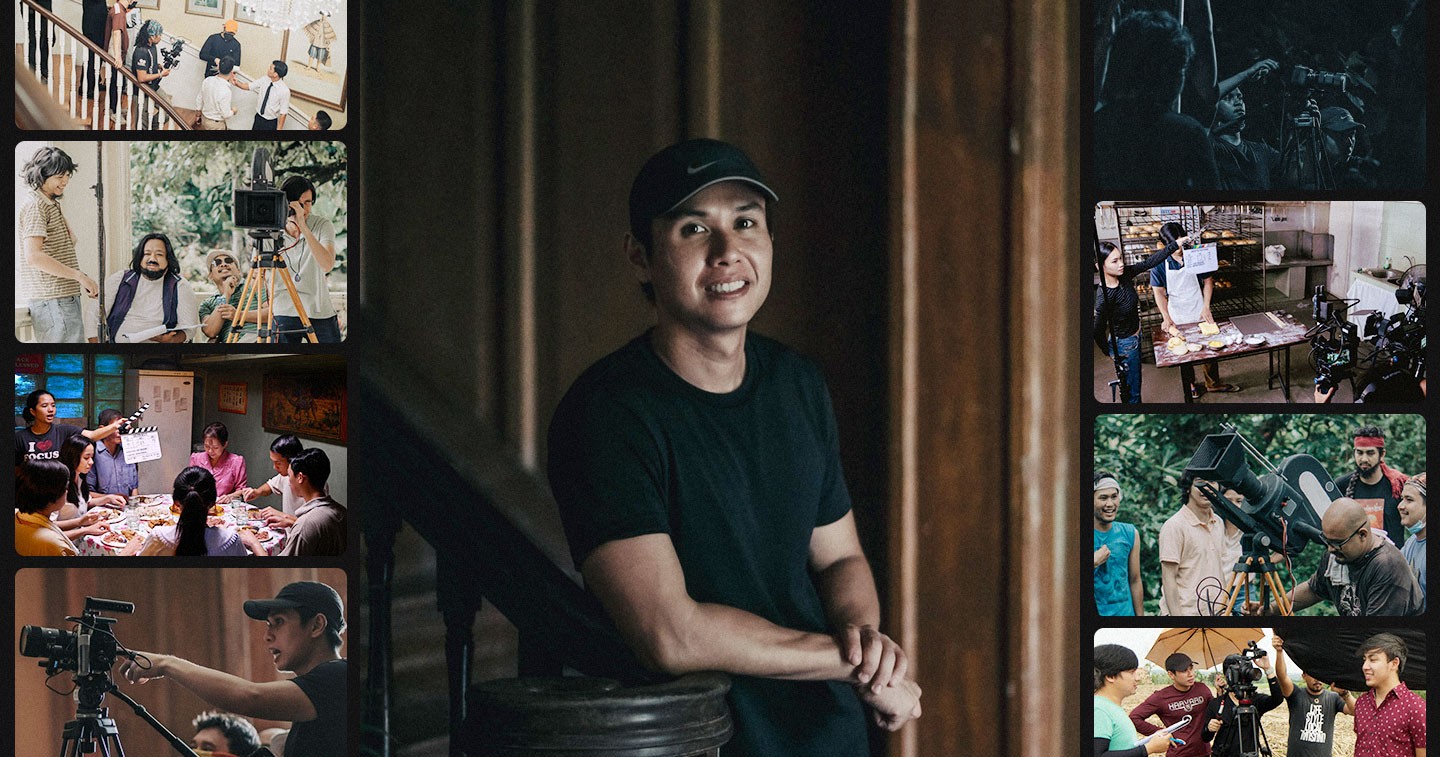BACOLOD, PHILIPPINES — What does the world look like through the eyes of a 12-year-old? Is it bright and beautiful, like a movie in full color? Or Is it scary and mysterious, like the deep end of the ocean? For Kurt Soberano, way back in 2004, it was suddenly brimming with promise, adventure, and curiosity.
Right after auditioning for the Christmas musical Glorious, 12-year-old Kurt vowed something in secret: he would dedicate his entire life to all things film and theater. This commitment set the stage for his journey into cinema, culminating in the recent debut of his first full-length film, Under a Piaya Moon, at PureGold’s inaugural CinePanalo film festival nearly two decades later.



Adobo Magazine had the opportunity to catch up with Kurt over coffee a few days after Under a Piaya Moon premiered in Bacolod, where it was conceptualized and filmed. As a director, Kurt proudly acknowledges Bacolod as his hometown, choosing to tell stories that explore its various facets. In fact, all his films reflect deep connection to his roots: Azucar presents a romance set against Negros Occidental’s sugarcane industry; Jameson and Golden Bells creatively retell the story of Kurt’s grandfather and his business in Bacolod; Pagdayaw depicts friendships in the province; Sa Balay ni Papang pays tribute to legendary Director Peque Gallaga’s legacy in the local film and theater community; and Under a Piaya Moon highlights local Negrense delicacies.



In an industry dominated by Manila-centric narratives, it’s refreshing to see regional stories being told with such authenticity and care. Kurt goes so far as to make sure that local creatives are involved throughout the whole filmmaking process and that Negros is not just a backdrop, but central to the plot.
“No one else can tell our story better than us Negrenses,” he said with a smile.
True enough, this approach has proven effective in the accolades garnered by his films. Under a Piaya Moon clinched a total of eight awards, including Best Picture, at this year’s CinePanalo Festival. Meanwhile, Golden Bells was previously honored with the esteemed title of Best Short Film at the 71st Film Academy for Movie Arts and Sciences (FAMAS).



Reflecting warmly on his beginnings, Kurt recounted how he discovered his passion for film and theater after his friends encouraged him to audition for Glorious. He quickly immersed himself in the craft, actively auditioning for roles and participating in workshops that proved pivotal in shaping his career path. The Negros Summer Workshops, which later evolved into Right Angle and then Bacollywood, were particularly formative, instilling in him not only the technical skills of acting and filmmaking but also a deep-seated appreciation for community and collaboration.
Over the years, Kurt has taken about 20 classes under the workshops — everything from film production and cinematography to various acting courses and even make-up for film and theater. He’s only ever missed the Director Apprenticeship class because Peque, the instructor, eventually stopped offering it before Kurt could enroll. When asked about his motivation to enroll in such a diverse range of classes, he said, “It’s because when I was young, I really, really loved what I was doing, especially in the workshops. Acting wasn’t enough. I wanted to be part of everything else.”
Recalling his early days as a “newbie” in various courses, he admitted, “Of course, I was afraid of failure — and I did fail in all these other subjects aside from acting because I wasn’t good at them. I’m not good at make-up. I wasn’t good at art direction. But as you grow older, you get to develop how it should be done in your own way. I don’t regret taking any of those classes because I come every summer with an open book and an open heart, hoping to fill my skillset.”
In the nurturing environment of the workshops, where trial and error were encouraged, Kurt learned early on not to be afraid or embarrassed by his limitations. He remembers his instructors emphasizing that the only failure is not attempting the exercise or task, which hinders growth. They fostered a safe space for “play,” where trying new things and making mistakes were valued as part of the learning process.
Embracing the ups and downs of each experience, he added, “Some summers were good, some were great, others were bad. It’s all part of the package. That’s life.”
Kurt went on to tell adobo Magazine about the moment he first felt like he belonged to the community of artists in Bacolod City. It was after attending his first Negros Summer Workshop in 2005. From then on, he felt deep in his bones that he was meant to be a part of this collective of dreamers and doers.
The supportive community within the workshops aligned with Kurt’s personal values, starkly contrasting the competitive nature he encountered in larger theater groups.
Comparing Bacolod’s performing arts scene to others, Kurt noted, “What sets us apart is that we’re so passionate about what we do. While there’s nothing wrong with it, we don’t take acting classes because we want to be famous. We don’t create films because we want to make money. We’re here because we’re really passionate, and we enjoy what we do.”
Kurt credits his first director, Rene Honojales, for a key piece of advice that has stayed with him: “He told me if there’s anything that you should leave with this world, it’s doing good. There’s already a lot of negative energy [out there], so the best you could do is spread good.” This viewpoint is evident in Kurt’s films, which often center on themes of family and mentorship. “Jameson and Golden Bells were for my grandfather, Balay ni Papang was for Peque, and Under A Piaya Moon was for my grandmother.”





This guiding principle extends to his approach to filmmaking, where he welcomes collaboration and mutual respect across all roles. “As a Director, I have a vision and know what I want,” he began. “But I’m also open to what other people say, from the Assistant Director to the Director of Photography, because they can see things I might have overlooked. Their feedback is very helpful to me.”
He added, “It doesn’t matter if it’s someone older or someone much younger. Film is a collaborative art. You’re supposed to help each other.”
This outlook took on even greater significance for Kurt after his grandfather’s passing in 2016, intensifying his drive to create meaningful cinematic tributes to loved ones and the unique stories of his community.
“Film is timeless,” he mused, noting that the medium allows him to capture moments while also preserving deeply personal memories. Case in point: Golden Bells.



“We filmed it in the store my grandfather created,” the director explained. “They were going to tear the whole thing down, and I didn’t want that image to go away — that’s why I shot it in the whole building. Now it doesn’t exist, but if I want to go back to that place in time, I just have to rewatch my film.”
Contemplating the broader scope of his work and vision for the future, Kurt delved into the intricacies of mentorship and the future of Bacolod’s creative scene.
“When I think about keeping my mentors involved, it’s because we’re a community,” he expressed. “I started out with them, and we’re gonna do it together — all the way.”
Looking ahead, Kurt opened up about the state of Bacolod’s filmmaking and theater community following Peque’s passing. “I think when he died, a lot of things went with him,” he said candidly. “The theater scene isn’t as vibrant here anymore. It’s been a while since we’ve seen performances, community theaters, independent theater. It’s all confined to small spaces. We need to revive full-length plays and rejuvenate our theater culture.”
Despite the strides made in film, Kurt stressed the importance of revitalizing theater as a distinct art form. “Theater is a different discipline,” he told adobo Magazine thoughtfully. It’s a replication of life on stage —a well-rehearsed drama with no cuts and takes, involving both actor and audience.”
After all, theater plays a crucial role in inspiring community members to create and share stories that resonate with their experiences. Kurt believes that nurturing the theater scene alongside filmmaking enriches cultural life in Bacolod and provides artists with diverse avenues to express themselves creatively.


Once the student, and now the teacher, Kurt’s journey has come full circle as he’s been an instructor at Bacollywood for several summers now. He hopes to impart the values of collaboration, mentorship, and enduring passion to those who take his class.
As the director introduces young and aspiring artists to stage and cinema, he plants seeds of inspiration that, unknowingly, take root in budding minds. And who knows? There might be a 12-year-old somewhere, perhaps watching Under a Piaya Moon or taking their first Bacollywood workshop, who becomes so inspired by Kurt’s work that they feel the unmistakable pull and make a secret, solemn vow — to dedicate their entire life to all things film and theater.








